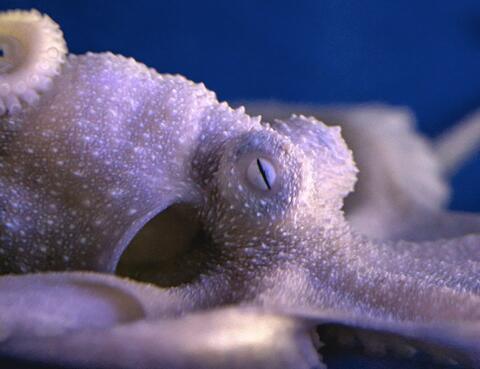
Laure Bonnaud-Ponticelli: "The octopus has phenomenal analytical capacities!”
Gone are the days when the octopus was, in the collective imagination, a frightening sea monster attacking Jules Verne’s Nautilus. The image of the octopus has now changed. For example, the cephalopod took on the pseudonym Paul during the 2010 soccer World Cup, and made predictions about the outcomes of games (more or less successfully.) More recently, in My Octopus Teacher, a multi award-winning documentary film (including the Oscar for best documentary film in 2021), we discover an animal that is not only endearing, but endowed with exceptional abilities. To find out more, we spoke with Laure Bonnaud-Ponticelli, professor at the MNHN, biologist and cephalopod specialist.
Why do we say that the octopus is intelligent?
Laure Bonnaud-Ponticelli : I’m not sure if the term “intelligent” is appropriate, as it’s a very anthropocentric notion. I’d prefer to say that it has good cognitive, behavioral and learning capacities. The octopus is able to analyze situations, to identify problems, to learn from its environment and to reproduce actions.
Some say they have nine brains, but it is a little more complex than that. Octopuses have a large central brain, located between the two eyes. They also have ganglia at the base of each of their eight arms. These are like mini nerve centers that are part of the peripheral nervous system. It has been shown that there is a form of parallel control of these ganglia on the movement and functioning of their arms, a function that would be independent of central control.

The brain of an octopus is not a simple mass! Inside, we can distinguish lobes that manage specific functions: the upper part is dedicated to the analysis of the environment and the lower part to motor functions, locomotion and those associated with chromatophores. These pigmentary cells on the surface of the skin are found in all animals, but in cephalopods, they have the particularity of being real integrated organs, neuromuscular organs controlled directly by the nervous system. They know how to adapt the color of their skin, as well as their shape, according to the situation they encounter. The octopus is a master of the art of camouflage!
Can you give some examples of so-called "intelligent" behaviors?
L.B-P. : It is important to understand that the octopus learns is not only physical, it is also visual. It is capable of observing a congeneric and imitating it. This is also the case for cuttlefish. We have seen small cuttlefish in aquariums able to reproduce the behavior of their friends very quickly. It is quite incredible!
We also noticed that the octopus has a very acute bodily "consciousness" of its environment. Because of its morphology—its soft body—it can easily contort itself... except in one place, between the two eyes, where the brain is enclosed in a cartilaginous capsule unable to compress itself. Any passage will thus be conditioned by this constraint of size of the capsule.
When an octopus is shown a path through circular openings of different diameters, it will evaluate each one using its arms, and will end up passing only through the hole in which the diameter is just larger than its distance between the two eyes. We humans can't do that. If we were in the same situation, we would not be able to estimate a distance so accurately, except with instruments or by trying to see if we can get through. Our bodily "awareness" of the environment is much lower!
The octopus can also learn from a tutorial. One of the many experiments conducted on them consisted of placing an octopus in the presence of a particular problem, namely to open a box containing a crab, of which the lid is crossed by a tube. The only way to access the box was to remove the tube so that the lid could be lifted.
After hours of trying to find a solution, the octopus finally lost interest. Then, the research team played him a video in which he could see a human hand removing the tube and successfully accessing the crab. This video was played to him over and over again. After 30 minutes, the octopus analyzed the situation and went on to remove the tube. Its capacity of analysis is phenomenal! A small child would not know how to do that.
The octopus has a very acute bodily "consciousness" of its environment.
Do octopuses feel pain?
L.B-P. : Of course! They feel pain and suffering. We observe obvious manifestations of stress. They can even die from it. We also see this before hatching. At the embryonic stage, these animals are extremely sensitive to their environment, to the slightest variation in light...
In 2013, cephalopods entered the European legislation for animal experimentation. This means that when we, as scientists, do experiments on these animals, we have to make project authorization requests that explain all the conditions of the experiment, so that it causes the least suffering and pain to the animal.
We compensate any pain with medication. However, in cephalopods, this is complicated, because there is a great diversity of reaction depending on the species. We are still working on the best ways to improve their well-being.
In your opinion, do cephalopods have a conscience?
L.B-P. : Consciousness is very difficult to define. Recently, it has been considered that octopuses might be able to dream. We have seen that an octopus in its sleep phase had reactions at the level of its skin: it changed color, for example. We can interpret this as dreams, but everything is still in the state of hypothesis.
Your research is mainly focused on cuttlefish, a cousin of the octopus and squid. Can you tell us more about it?
L.B-P. : In 2004, I set up my own research team on the evolution of cuttlefish embryo development at the BOREA laboratory (MNHN/Sorbonne University/CNRS/IRD/University of Caen/University of the West Indies). In France, this animal is studied above all other species. This is linked to our heritage. In the past, cuttlefish was the second species that landed on the Normandy coast after the scallop. There was thus a local interest in studying it. The octopus is an animal rather emblematic of southern countries, which is much less common on the Breton coasts since the harsh winter of 1952, but which is gradually returning.
There is a fabulous experiment on cuttlefish that I would like to share with you that was conducted by the team of Christelle Jozet-Alves at the University of Rennes. They wanted to see if the cuttlefish was able to regulate itself in terms of food consumption. To do this, they included two cohorts of cuttlefish that had the same amount of crabs to eat at lunchtime. However, in the evening, one cohort had shrimp from time to time and the other had shrimp all the time. It should be noted that cuttlefish are more fond of shrimp than crab.
The research team found that as the experiment progressed, the first cohort ate, or even increased, their amount of crab at lunchtime, while the second decreased it. They knew that in the evening, a dish of shrimp was waiting for them. This is a very nice experiment of anticipation and regulation of one's own eating behavior according to environmental conditions.
Who is Laure Bonnaud-Ponticelli?
Laure Bonnaud-Ponticelli is a professor at the Muséum national d'Histoire naturelle (MNHN), a biologist and a researcher at the Laboratoire de biologie des organismes et des écosystèmes aquatiques (BOREA).
"In seventh grade, I had a natural science teacher who was absolutely fabulous. He had us dissect a mussel and a shrimp, and I became passionate about it! From that moment on, I told myself that I really wanted to work in marine science. During my DEA, I did an internship in Renata Boucher-Rodoni’s team, a great specialist in cephalopods, and I fell in love with these animals."
